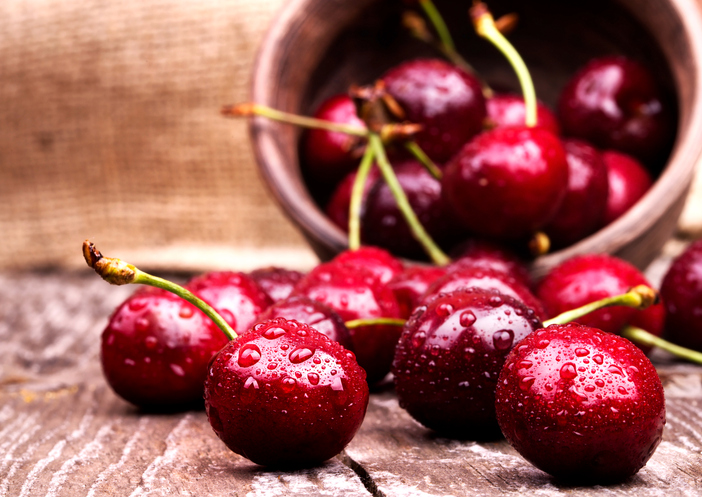Best 5 Foods To Aid Sleep
Sleep deprived? Check these simple tips on what to eat and what to avoid.

Four in ten of us don’t get enough sleep, which affects our mood, productivity and rest the next day.
Sleep is vital for our overall health as sleep is when our body is working to keep us healthy so if it is lacking you will see the results in mood, physical and emotional responses.
Although it is possible you have a sleep disorder, for the majority of us it’s because of lifestyle factors including what we eat and drink.
What should you be eating?
Certain foods can help with your sleep thanks to their ingredients, so things like cherries, bananas, seaweed and kale can help with your sleep.
So what are the top 5?
1. Tart cherries
Cherries – especially tart cherries – are rich in the sleep hormone melatonin which not only regulates your sleep-wake cycle so you’ll be sleepier in the evening but you are more likely to wake up with more energy too.
In addition to promoting weight loss, cherries also contain antioxidants like anthocyanins, which work alongside melatonin to help you maintain a deeper sleep for longer.
2. Bananas
Another fruit to stock up on before bed is bananas, which are filled with magnesium. This is the mineral that helps to induce muscular relaxation and mental calmness, two essential qualities for a good nights sleep.
Bananas supply the body with vitamin B6m which helps convert the amino acid tryptophan into melatonin to help you get a deeper sleep.
3. Sardines
Like salmon and tuna, sardines contain 61 per cent of your daily omega 3 needs.
A good choice for dinner, they will help you to a good nights sleep because they help to reduce anxiety, which is a key factor in night time worries and anxiety which can interrupt sleep.
4. Seaweed
If you’re not fond of eating fish, or are vegetarian or vegan, you could also try seaweed – which is a good alternative to fatty fish.
It will also give you the essential It will also give you the essential nutrients needed for sleep, including omega 3s, amino acid tryptophan and magnesium.
5. Kale
This has been increasingly seen as a healthy option to our diet, particularly if you’re trying to lose weight, but it can also help your sleep too.
Vegetables such as kale and spinach are not only high in calcium but assist in the production of melatonin,’ she said.
Because of its high fibre content, it will also help to keep any midnight cravings at bay.
What should you be avoiding?
You might be doing all the right things by eating the top five sleep inducing foods, but if you are sabotaging your efforts with things that work actively against that it won’t help.
1. Coffee
While you might know that coffee in the afternoon can be a bad idea for your sleeping patterns, what you might not realise is the fact that even a decaf coffee could be sabotaging your sleep.
Just because it is decaffeinated, that does not mean it has no caffeine in it. The average will have around 7mg and if you are a sensitive sleeper, that will be enough to keep you awake.
So instead of caffeine switch to a herbal tea and there are some excellent blends that have a combination of ingredients to help relax you and get ready for bed.
Or try a herbal supplement such as Wellsprings Sleep Capsules that includes ingredients such as L-Tryptophan, magnesium, lemon balm and L-Theanine.
Chamomile tea is found by many to be very relaxing, but it can be an acquired taste so you might want to add a little honey, or look for a blend that includes valerian, passionflower, lavender, lemon balm and chamomile.
2. Red wine
It is a popular belief that a glass of red wine will help you relax because it acts as a sedative.
Many reach for a glass of red after a long week at work, because wine acts as a ‘sedative’ and helps to make us feel relaxed.
Unfortunately this is just not true, it is not a sedative and it will only limit your REM sleep and cause you to wake up later in the night.
If you enjoy a glass of red, try and have it with your dinner and at least one hour before you go to bed.
This will give the alcohol a chance to process in your body before you try to sleep.
3. Dark chocolate
Pleasurable although this is, if you want a good nights sleep you need to avoid this.
But unfortunately it is also rich in caffeine, it has as much as 25 per cent of a standard cup of coffee, And combined with all it’s sugar content it won’t help you sleep.
It does have a health benefit, in that it contains magnesium, so best to keep it to a morning or afternoon treat.
4. Cheese
I was always told by my mother that cheese gave you bad dreams, which I thought was an old wives tale, and indeed it is a regular last course for dinner.
However, it seems that my mother was right as research shows that cheese is a major contributor to strange and restless dreams.
Researchers believe this is due to the effect of cheese on mood and cognition.
5. Spicy foods
Fond as we are of spicy foods like curries, ingredients like chillies and mustard are also known to raise your body temperature and make you restless during sleep.
For most women at Menopause night sweats are a very real fact of life, so if you are very fond of spicy food try to have it earlier in the day such as at lunchtime.
Helpful information:
Unfortunately many women do experience issues with sleep at Menopause, sometimes due to hot flushes and sweats at night, or a general rise in anxiety and stress, so first get those out of control hormones back under control.
Dealing with any stresses is also a good step forward as it can be have such an impact in all areas of your life, both physical and emotional, and any change in your menopause symptoms often will also affect your sleep.
If you have experienced a bad night’s sleep, then this article can help you recover.
https://anna.blog.wellsprings-health.com/how-to-help-yourself-after-a-bad-nights-sleep/



















